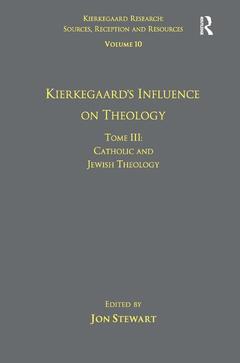Volume 10, Tome III: Kierkegaard's Influence on Theology Catholic and Jewish Theology Kierkegaard Research: Sources, Reception and Resources Series
Coordonnateur : Stewart Jon

Date de parution : 06-2012
15.6x23.4 cm
Date de parution : 11-2016
15.6x23.4 cm
Thème de Volume 10, Tome III: Kierkegaard's Influence on Theology :
Mots-clés :
Kierkegaard; christoph; Erich Przywara; schrempf; Romano Guardini; kierkegaards; Kierkegaard’s Thought; thought; Kierkegaard’s Work; erich; De Lubac; przywara; Hans Urs Von Balthasar; romano; Henri De Lubac; guardini; Kierkegaard Studies Yearbook; hans; Halakhic Man; urs; Society Of Jesus; Christoph Schrempf; Kierkegaard’s Philosophy; Stimmen Der Zeit; Le Drame; Ignatius Press; Kierkegaard’s Concept; Furcht Und Zittern; Baron Friedrich Von; Kierkegaard’s Existential Philosophy; Gertrud Von Le Fort; Danish Lutheran Church; Modest Head Start; Kierkegaard's Influence; Kierkegaard’s Reception



